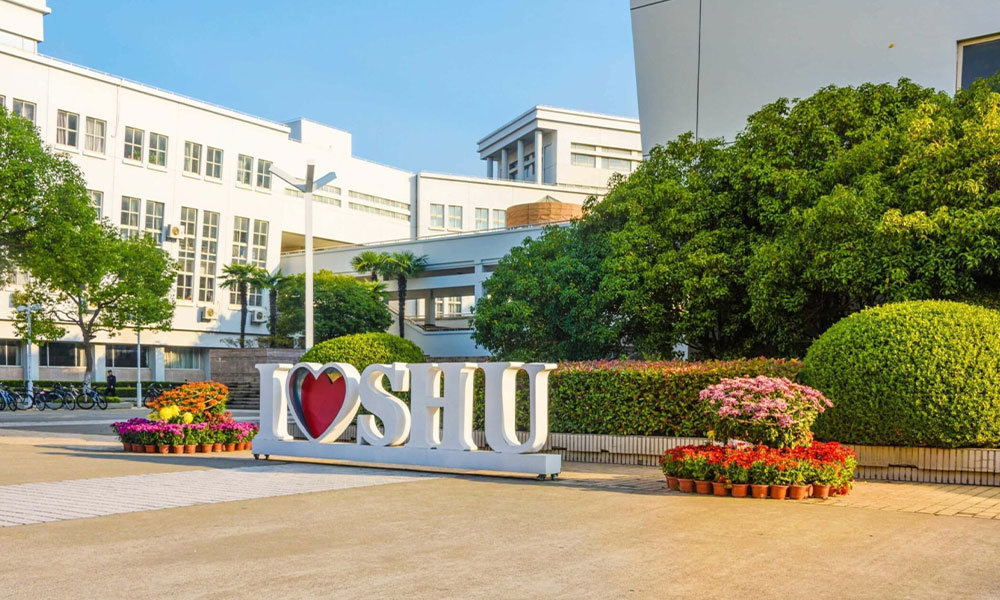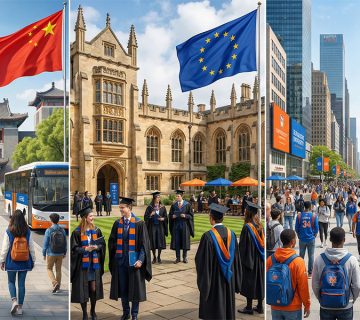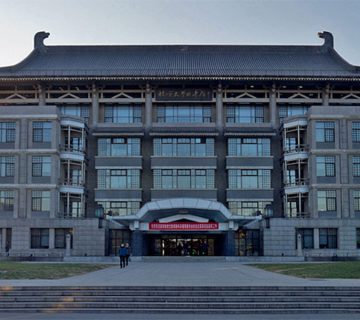Shanghai, the pulsating heart of modern China best city for Study in China, isn’t just a skyline of gleaming skyscrapers and neon lights—it’s a launchpad for ambitious minds chasing dreams in one of the world’s most dynamic cities. As we hit October 2025, the buzz around studying here has only intensified, with enrollment numbers for international students climbing steadily amid China’s push for global talent. Picture this: over 60 universities dotting the city, from historic powerhouses like Fudan to innovative hybrids like NYU Shanghai, all beckoning with programs that blend Eastern innovation with Western rigor.
But what draws so many—over 40,000 internationals last year alone—to these campuses? It’s the promise of cutting-edge research, unbeatable networking in Asia’s financial hub, and fees that won’t break the bank compared to peers in London or New York. Study in Shanghai universities feels like stepping into a whirlwind of opportunity. These institutions aren’t isolated ivory towers; they’re woven into the fabric of a city that’s home to tech giants like Alibaba and global forums like the China International Import Expo.
For a fresh undergrad from Manila or a mid-career pro eyeing an MBA, the appeal lies in the diversity: English-taught tracks for those rusty on Mandarin, plus immersion options that sharpen language skills alongside academics. Yet, amid the excitement, questions linger—how do you even get in? What’s the real tab on tuition fees of Shanghai universities and daily life? Drawing from official portals and student guides updated through mid-2025, this article from … unpacks it all, helping you navigate from admission requirements of Shanghai universities to that first taste of xiaolongbao on campus.

Admission Requirements of Shanghai Universities
Study in Shanghai universities for 2025 intakes isn’t about flawless perfection—it’s about showing potential wrapped in preparation. Take Shanghai University (SHU), founded in 1922 and now a multicultural hub with over 2,700 internationals from 150 countries. Their process, streamlined via the China Admissions portal, kicks off with basics: a valid passport, proof of good health, and being at least 18. For undergrads, expect to flash a high school diploma with a GPA of 3.0 or higher on a 4.0 scale—no small feat, but achievable with solid transcripts.
Master’s hopefuls need a relevant bachelor’s and a 2.5 GPA minimum, while PhD applicants push for 3.0 plus research chops like publications or proposals. Language hurdles? They’re surmountable. English-taught programs—think business or engineering at SHU—demand IELTS 6.5 (no band below 6.0) or TOEFL iBT 90, scores valid within two years. Native speakers or those with English-medium degrees often skip this, a relief for many.
Then there’s the document deluge: transcripts, a study plan (500-800 words on your goals), financial affidavits proving you can cover costs, and even a no-criminal-record cert from your home country. Arts applicants toss in portfolios; everyone pays a non-refundable RMB 500 application fee. Deadlines? SHU’s window runs November 30, 2024, to June 30, 2025—plenty of time, but pros advise starting early for interviews, which blend video calls with faculty grilling your fit.
Contrast that with Shanghai Jiao Tong University (SJTU), the 1896-born giant ranked #47 globally in QS 2026. Admission requirements of shanghai universities of this university for 2025 emphasize holistic reviews: undergrads submit SAT/ACT scores alongside GPAs above 3.5, while master’s and PhDs require GRE for STEM fields and recommendation letters from profs who’ve seen your grit. SJTU’s online portal mirrors SHUs, but adds a twist—pre-admission notices for competitive programs like naval architecture, letting you lock in scholarships faster. Fudan University, another C9 League star to study in Shanghai universities, ups the ante with HSK Level 4 for Chinese-taught tracks, though their 100+ English options ease the barrier.
For joint ventures like NYU Shanghai, it’s a portal to two worlds. Admissions mirror NYU New York’s: Common App essays, teacher evals, and interviews, but with a global lens—diversity statements shine here. No wonder acceptance rates hover at 10-20% across these elites; it’s selective, yet fair.
Pro tip from recent admits: Tailor your study plan to Shanghai’s vibe—mention interning at the Bund or researching AI ethics in Pudong. By mid-2025, universities like East China University of Science and Technology (ECUST) reported a 15% uptick in apps, crediting virtual tours and AI-driven eligibility checkers. Miss a doc? No sweat—most allow amendments till the cutoff.
Tuition Fees of Shanghai Universities
Money talks, but for study in Shanghai universities, it whispers affordably. Tuition fees of Shanghai universities range from CNY 20,000-50,000 ($2,800-$7,000) yearly for undergrads, scaling to 30,000-60,000 for masters. SHU exemplifies this—bachelor’s in international economics rings in at CNY 25,000 annually, while MBBS hits 40,000, per their 2025 fee planner. Add-ons? Application RMB 500, insurance CNY 800, and dorms at 4,000-8,000 yearly. It’s a steal versus the U.S., where equivalents top $50,000.
SJTU follows suit: Engineering undergrads pay CNY 24,800; business master’s, 42,000. Their 2025 bulletin flags a 3% hike from inflation, but freezes for scholarship holders. Fudan? Similar ballpark—CNY 30,000 for liberal arts, up to 50,000 for med tracks. Then there’s the wildcard: NYU Shanghai, where the global tag ups the ante to $65,622 tuition for 2025-26, plus $1,330 books and $18,000-ish housing/meals. Why the premium? Dual degrees, NYC access, and perks like study-abroad stipends. Yet, even here, need-based aid covers 70% for qualifiers.
Private or Sino-foreign joints like Xi’an Jiao Tong-Liverpool (with a Shanghai outpost) dip to $13,000, blending affordability with Western cred. Deposits secure spots—half or full year’s tuition upfront, refundable minus fees if you bail early. By fall 2025, whispers of currency fluctuations nudged fees up 2-5%, but government caps keep it grounded.
Popular Majors in Shanghai Universities
Study in Shanghai universities pulse with majors mirroring the city’s DNA: finance-fueled business, AI-driven tech, and culture-infused arts. Business reigns supreme—SJTU’s Antai College pumps out MBAs with Wall Street ties, blending case studies on Alibaba’s empire with internships at HSBC. Enrollment? Up 20% in 2025, fueled by China’s 5% GDP growth forecast. Engineering follows close: Tongji University’s civil tracks, leveraging Shanghai’s mega-projects like the Yunshan Port, draw 1,000+ internationals yearly. Hands-on? Think drone labs and sustainable urban design sims.
Computer science and data analytics explode at Fudan, where English-taught bachelor’s integrate Python with Mandarin modules—grads snag roles at ByteDance averaging CNY 200,000 starting. Medicine’s no slouch; SHU’s MBBS, WHO-listed, mixes lectures with rotations at Ruijin Hospital, fees notwithstanding. For creatives, Shanghai University’s Film Academy churns Oscar hopefuls via screenwriting labs and festival tie-ins. Liberal arts? NYU Shanghai’s global studies dissect Belt and Road geopolitics, with electives in interactive media.
Emerging stars: Environmental science at ECUST tackles Yangtze pollution, while biotech at SJTU leverages CRISPR breakthroughs. 2025 trends? AI ethics and fintech majors spiked 30%, per admissions data, as Shanghai eyes “smart city” status.

Scholarships of Shanghai Universities
Scholarships aren’t mythical for study in Shanghai universities—they’re lifelines, slashing costs by 50-100%. The Shanghai Government Scholarship (SGS), revamped for 2025, leads the pack: Category A (full) blankets tuition, dorms, insurance, and CNY 2,500-3,500 monthly stipends for undergrad/master’s/PhDs. Apply via university portals by May 31; eligibility? GPA 3.0+, HSK 4 for Chinese tracks, and no concurrent aid. SHU’s 2025 batch awarded 500 spots, prioritizing STEM.
Chinese Government Scholarship (CSC) via www.csc.edu.cn covers 279 unis, including Shanghai’s elite—full rides for 3,000 RMB/month, but skips MBBS/MBAs often. Deadline: February 15, 2025; agency number for SHU is 10280. City-specific gems? SGS Class B nixes living stipends but zeros tuition/insurance. SJTU’s tiers: First-class (full tuition + 2,500 CNY/month) for top admits; third-class, 25% off.
Uni-endowed? SHU’s New International Student Scholarship auto-selects from CSC/SGS pools—no extra app. NYU Shanghai doles need-based grants up to $60,000, plus merit for 4.0 GPAs. Confucius Institute adds language buffs CNY 2,500/month. Tips from 2025 winners: “Layer apps—CSC first, then SGS.” Success rate? 20-30% for qualifiers, with alums like a Filipino ECUST PhD crediting it for “debt-free innovation.”
Cost of Living as a Student in Shanghai
Shanghai’s siren song comes with a wallet workout, but savvy budgeting keeps it under $1,000 monthly. Dorms anchor affordability: CNY 1,500 single, 900 double at SUMHS or SHU—subway-adjacent, with AC and laundry. Off-campus? Shared flats in Minhang run CNY 2,500-4,000, per 2025 Numbeo data, spiking 5% from tourism rebound.
Food’s a feast on a dime: Campus cafeterias dish noodles for CNY 10-15; street stalls like jianbing hit 5-8. Monthly tally? CNY 1,500-2,000, veggie-heavy for health-conscious. Transport? Metro’s CNY 3/ride, or 200 monthly passes—zips you from Pudong to the Bund sans traffic hell. Utilities/internet: CNY 300 bundled.
Leisure? Free parks like Century Park; Netflix alternatives CNY 50/month. Health? Insurance CNY 800 covers basics; exams CNY 460. Total for frugal types: CNY 6,000-8,000 ($850-1,100), per Masters portal’s 2025 update—higher in Puxi (add 20%). Inflation nudged groceries 3% by October, but student discounts (e.g., Alipay deals) counter it. Vets say: “Bulk-buy at wet markets, bike-share for fun—Shanghai rewards the resourceful. “In wrapping this Shanghai saga, remember: It’s not just a degree—it’s a transformation. From decoding admission puzzles to mastering maglev commutes, 2025’s scene empowers dreamers. admission requirements of shanghai? For additional information keep in touch.
FAQs
1.What are the key admission requirements of shanghai universities for international students in 2025?
To study in Shanghai universities like Shanghai University (SHU) or Shanghai Jiao Tong University (SJTU), international students need a valid passport, be at least 18, and provide a high school diploma (GPA 3.0+ for undergrads) or relevant bachelor’s/master’s degree (GPA 2.5-3.0 for graduate programs). English-taught programs require IELTS 6.5 or TOEFL iBT 90, while Chinese-taught tracks need HSK Level 4. Additional documents include transcripts, a 500–800-word study plan, financial proof, a no-criminal-record certificate, and a RMB 500 application fee. Deadlines typically span November 2024 to June 2025, with interviews for competitive programs.
2. How much are the tuition fees of shanghai universities and living costs for studying in Shanghai in 2025?
Tuition fees of shanghai universities like SHU, SJTU, or Fudan ranges from CNY 20,000-50,000 ($2,800-$7,000) annually for undergrads and CNY 30,000-60,000 for master’s programs. Joint ventures like NYU Shanghai charge up to $65,622 yearly. Additional fees include insurance (CNY 800) and dorms (CNY 4,000-8,000/year). Living costs average CNY 6,000-8,000 ($850-$1,100) monthly, covering dorms (CNY 900-1,500), food (CNY 1,500-2,000), and transport (CNY 200 metro pass). Off-campus housing or a Puxi lifestyle can push costs 20% higher.
3. What scholarships are available for international students to study in Shanghai universities in 2025?
The Shanghai Government Scholarship (SGS) offers full (Category A) or partial (Category B) coverage, including tuition, dorms, insurance, and CNY 2,500-3,500 monthly stipends for eligible students (GPA 3.0+, HSK 4 for Chinese programs). The Chinese Government Scholarship (CSC) provides similar benefits, with applications due by February 15, 2025. Universities like SHU auto-consider top applicants for additional awards, while NYU Shanghai offers need-based grants up to $60,000. Success rates range from 20-30%, and layering CSC with SGS applications maximizes chances.





No comment